
We speak with Al Jazeera managing editor Mohamed Moawad after Israel assassinated five of the network’s journalists in Gaza, including veteran correspondent Anas al-Sharif, in an airstrike Sunday on a media tent outside Al-Shifa Hospital. Al Jazeera has condemned the attack as an attempt to silence reporting on Israel’s planned seizure and occupation of Gaza. The strike also killed Mohammed Qreiqeh, Ibrahim Zaher, Moamen Aliwa and Mohammed Noufal, and came just weeks after the United Nations and press freedom advocates warned al-Sharif’s life was at risk following Israeli accusations linking him to Hamas.
“The pattern is clear: degrading, delegitimizing, smearing, and then killing,” says Moawad. He says the network, which is one of the few international outlets with local journalists, is now “scrambling” to cover the conflict as Israel prepares a renewed assault and occupation of the territory. “They went after Al Jazeera because we are the only international organization covering the conflict from the frontline.”
Transcript
AMY GOODMAN: We begin today’s show in Gaza, where the Israeli military has admitted assassinating one of the most prominent journalists in Gaza, Al Jazeera correspondent Anas al-Sharif, along with four of his colleagues at the network. They were killed in an Israeli airstrike on their media tent outside Al-Shifa Hospital. Al Jazeera decried the targeted killing as a, quote, “desperate attempt to silence the voices exposing the impending seizure and occupation of Gaza,” unquote.
Funerals were held today for a Anas al-Sharif, his fellow correspondent Mohammed Qreiqeh, the cameramen Ibrahim Zaher and Moamen Aliwa, and their assistant, Mohammed Noufal. The attack came just weeks after Al Jazeera, the Committee to Protect Journalists and a top U.N. official all warned al-Sharif’s life was in danger after Israel accused him of being a member of Hamas. At the time, U.N. special rapporteur for freedom of opinion and expression, Irene Khan, blasted Israel for spreading unfounded accusations about him. Today, she called for sanctions against Israel for the murder of the Al Jazeera team.
According to officials in Gaza, Israel has killed 238 journalists over the past 22 months. This is part of an obituary report by Al Jazeera on Anas al-Sharif.
AL JAZEERA REPORTER: He was one of the most recognizable voices reporting from Gaza since the war began in October 2023, among the few international journalists who remained in northern Gaza throughout the conflict, broadcasting even as Israeli forces ordered more than a million Palestinians to evacuate the area. Born in Jabaliya refugee camp, al-Sharif graduated from Al-Aqsa University’s media faculty. He became one of the key voices from Gaza’s frontlines.
Throughout the war, the 28-year-old reporter paid a high personal price for his commitment to truth. In December 2023, his father was killed when Israeli forces struck the family home in Jabaliya. This came weeks after death threats. Israeli officers told him to stop reporting, but he refused. When a ceasefire came into effect in January, relieved Palestinians celebrated as Anas shed his protective gear. The joy was short-lived. Israel broke the ceasefire in March. And in recent weeks, the pressure intensified. The Israeli army targeted him and his colleagues online, falsely accusing al-Sharif of being a Hamas member. Al Jazeera strongly denies those claims. The Committee to Protect Journalists warned his life was in acute danger. They called for international protection, but it never came.
Anticipating his murder by Israeli forces, a preprepared message was posted on his X account after his death, saying, “If these words reach you, know that Israel has succeeded in killing me and silencing my voice, I have lived through pain in all its details, tasted suffering and loss many times, yet I never once hesitated to convey the truth as it is, without distortion or falsification, so that God may bear witness against those who stayed silent and accepted our killing.” He ends, “Do not forget Gaza… And do not forget me in your sincere prayers for forgiveness and acceptance.”
AMY GOODMAN: Those the words of Anas al-Sharif, the Al Jazeera correspondent, to be released only if he was dead. That obituary report by Al Jazeera.
NPR reports this marks the first time since October 2023 that Israel’s military so quickly claimed responsibility after it killed a journalist in a strike. In fact, it killed the whole five-member Al Jazeera team that was camped out under a tent at Al-Shifa Hospital.
The attack came hours after Israeli Prime Minister Benjamin Netanyahu said he may allow international journalists into Gaza.
PRIME MINISTER BENJAMIN NETANYAHU: In fact, we have decided, and I’ve ordered and directed the military to bring in foreign journalists, more foreign journalists, a lot. There’s a problem of assuring security, but I think it can be done in a way that is responsible and careful to preserve your own safety. So, the directive has been since — when is it? Two days ago.
AMY GOODMAN: “To preserve your own safety,” Israeli Prime Minister Benjamin Netanyahu said to the International Press Corps at the news conference. Hours later, Israel assassinated the five-member Al Jazeera team that had a media tent outside Al-Shifa Hospital, and took responsibility for that strike.
For more, we’re joined in Washington, D.C., by Mohamed Moawad, managing editor of Al Jazeera.
Mohammed, our deepest condolences for the death of your Al Jazeera staff in Gaza. Just before we went to air, I watched the Doha offices of Al Jazeera, where scores of journalists and staff and workers gathered, holding up the pictures of not only the five men who were killed — and we’re talking about 25- and 26-year-olds; Anas al-Sharif is 28 years old, younger than Democracy Now! — not only holding up their pictures, but holding up the pictures of other Al Jazeera staff, journalists, correspondents, who have been killed in the West Bank and Gaza. First, your response to Israel assassinating five members of your team, five more members, led by Anas al-Sharif, who had become famous worldwide to the audience who watches Al Jazeera Arabic for describing what was happening in Gaza?
MOHAMED MOAWAD: Thanks, Amy, for having me, and thanks for the time.
It’s a devastating loss. Anas and Mohammed were the voices you heard from Gaza’s shattered streets, the steady tune that made chaos comprehensible. Mohammed and Anas were the eye behind the lens catching all the details to the world from Gaza City. They were the only two prominent voices left in Gaza.
You’ve heard Prime Minister Netanyahu admitting that no international journalist is allowed to enter Gaza, until he directed his team to allow them two days ago, subject to security issue. So, you have seen that admittance. He said it in his own words. And at the same time, you’ve seen silencing local journalists.
The pattern is clear: degrading, delegitimizing, smearing, and then killing, justifying the killing by unfounded allegations. You haven’t seen presented evidence. You haven’t seen any evidence of these allegations. But the world would say that “the IDF claimed, blah, blah, blah.” So, that’s what we have been seeing from the Israeli government from the start of this war. The fact that they have claimed the assassination of Anas al-Sharif right after carrying the attack means that all other journalists killed by Israel, over 200 journalists killed by the IDF, were — you know, no one was held accountable to that, so they felt like the journalistic community around the world and the international community isn’t concerned about what’s going on, so we can continue the pattern.
So, Anas and Mohammed’s voices aren’t silenced. The truth that they have been carrying to the world since the beginning of the war would echo in our coverage. We will continue the coverage. We aren’t in the business of weaponizing our platform against anyone, but to give voice to the voiceless and to make sure that the Gaza story is told to the world. We are scrambling around right now to find someone who can report it from inside Gaza City.
We have seen the announcement from the Israeli government that they are unleashing a new operation in that area, and that came right before targeting and killing Anas al-Sharif and Mohammed Qreiqeh, the only two prominent and left voices there. So, the fact that Anas and Mohammed weren’t on a frontline or in a military zone, not a collateral damage like the IDF used to say — they were in the last fragile refuge left for them, a tent that they fled to after their homes were destroyed by Israeli airstrikes. They were there. They thought that this tent would — like, you know, they are in tent, they are safe, the Israeli government wouldn’t target a journalist or kill a journalist in his tent or something like that. But, no, the assassination attempt was clear. The threats that Anas received days ago and since the beginning of this war was true. They have planned it.
And Anas was very resilient. I mean, we have been placing pressure on Anas and his colleagues to stay safe, to stop the coverage. Anas fainted at one moment on air while reporting because of starvation. And he did not stop the coverage. Sometimes he struggled to feed his family. He did not back down. He did not stop the coverage. He continued the coverage. He used to say to us, “Gaza’s story is my story. I’m not getting out of here. This is my people.” At a certain time, Anas al-Sharif criticized the whole situation of the international journalistic community and called for the journalistic community to stand strong to prevent any harm for him. But it seems like what’s happening right now is beyond the imagination, finally.
AMY GOODMAN: Let me ask you — a sixth journalist, Mohammed al-Khalidi, who worked as a freelance reporter, was also killed in the strike that targeted your team, the five members of the Al Jazeera team. That’s according to the director of Al-Shifa Hospital, right? That tent was right up against the hospital in the courtyard. That’s according to Al-Shifa Hospital director, Dr. Muhammad Abu Salmiya. Do you know anything about him?
MOHAMED MOAWAD: Of course. Those are photographers who were working with Anas and Mohammed Qreiqeh and bringing all the images from inside Gaza City. You know, the number of journalists are very limited in Gaza City reporting from there, after targeting so many journalists in that area. This is a frontline area. The whole area is a frontline itself.
AMY GOODMAN: Also, just looking at Agence France-Presse’s description of the funeral today: “Their bodies, wrapped in white shrouds with their faces exposed, were carried through narrow alleys to their graves by mourners including men wearing blue journalists’ flak jackets.”
His father, Anas al-Sharif’s father, was killed December of 2023 when an airstrike targeted their home in Jabaliya, where Anas himself grew up.
I wanted to ask you, Mohamed — as we just said, I watched that ceremony in your headquarters in Doha, where people stood in the offices and also were beamed in, like Irene Khan, the special rapporteur on freedom of expression. She called for Israel to be sanctioned for the killing of these journalists and also talked about — and we saw it in the report — Jodie Ginsberg, the head of the Committee to Protect Journalists, Irene Khan, Al Jazeera itself understood how targeted Anas was, when he was getting warnings by Israeli officials to stop reporting. What are you calling for now?
MOHAMED MOAWAD: We have been calling, since the beginning of the war, the international journalistic community to stand strong and take actions. I mean, I think not enough action has been taken by news outlets around the globe. We have seen more pressure being placed on governments and authoritarian regimes back then during the Arab Spring to allow journalists to cover what’s happening in Gaza. The fact that no international journalist is allowed to enter Gaza means that you can easily delegitimize any local coverage, as the Israeli government used to do. But if you have an international journalist who is reporting and bringing in eyewitness account of what’s happening, that would somehow guarantee the safety of other journalists locally in Gaza.
What we are seeing now, Amy, is something is dying in Gaza beyond the bodies. The journalism profession itself is dying. I mean, this profession is meant to illuminate the world and is being buried with its witnesses. Two hundred — 200 — journalists in Gaza were killed by Israeli airstrikes. You know, the space their deaths occupy in much of the global media disproportionately is small. Sometimes in modern history, news cycles would stop because there is a killing of a journalist. That’s not the case right now. Something is — something darker happening right now. They’re not targeting journalists by starvation or bullets or airstrike. What we are seeing now is silencing the coverage, the whole coverage. They went after Al Jazeera because we are the only international organization covering the conflict from the frontline. They went after us in Jerusalem, shutting down our office, went after us in West Bank, shutting down our office, went after our colleagues, killed our colleagues reporting, bringing in eyewitness account from the ground. So, it’s really alarming for the whole international journalistic community. The profession is under siege in Gaza. The profession is under attack. The fact that you’re not able to report on what’s going on means that in coming days, when a dictatorship commits crimes and no one is talking about, he will be immune of any international pressure placed on him.
AMY GOODMAN: Mohamed Moawad, I want to thank you for being with us, managing editor of Al Jazeera. We’re speaking to him in Washington, D.C. And again, from all of us at Democracy Now!, our deepest condolences on the death of your five-member team right outside Al Jazeera [sic] hospital. It is not only a loss — Al-Shifa Hospital. It is a loss not only, of course, though, to Al Jazeera, but to all of us as journalists, to the whole community around the world. Thank you so much for being with us.
When we come back, “This is not aid. This is orchestrated killing.” We’ll speak with the head of Doctors Without Borders, who’s talking about the Gaza Humanitarian Foundation, calling for its closure. Stay with us.
[break]
AMY GOODMAN: “Greed” by Sweet Honey in the Rock, performing in our old firehouse studio.

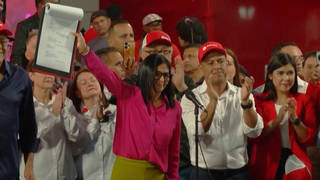
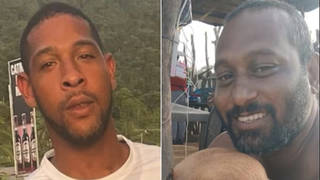
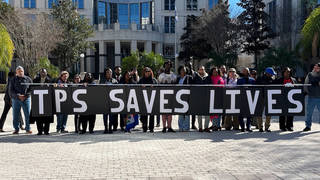
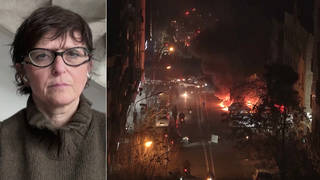





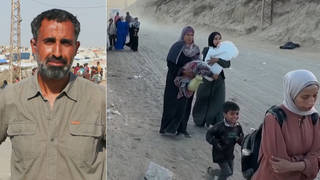

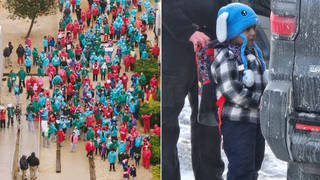
Media Options